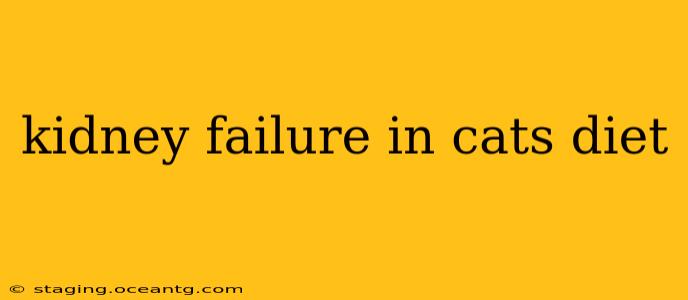Kidney disease in cats, also known as chronic kidney disease (CKD) or renal failure, is a prevalent and often progressive condition affecting feline health. Understanding and managing a cat's diet is crucial in slowing the progression of CKD and improving their quality of life. This guide delves into the specifics of feline kidney failure diets, addressing common questions and concerns.
What Should I Feed a Cat with Kidney Failure?
The cornerstone of managing CKD in cats is a specialized diet formulated to address the unique needs of their compromised kidneys. These diets are typically prescription diets available through veterinarians, and are not usually found in standard pet stores. These diets are specifically designed to:
- Reduce phosphorus: High phosphorus levels exacerbate kidney damage. Prescription diets carefully control phosphorus content.
- Manage protein levels: While protein is essential, excessive protein can overload the kidneys. These diets provide a moderate protein level, often using high-quality, easily digestible protein sources.
- Control potassium: Elevated potassium levels can be dangerous for cats with kidney disease. Prescription diets carefully regulate potassium intake.
- Provide adequate calories: Maintaining a healthy weight is critical, even with kidney disease. These diets provide enough calories to prevent weight loss.
- Supplement with antioxidants: Antioxidants help combat oxidative stress, a contributor to kidney damage.
What are the Best Foods for Cats with Kidney Disease?
The "best" food is always a prescription diet tailored to your cat's specific needs, determined by your veterinarian through blood tests and assessment. These diets are scientifically formulated and undergo rigorous testing to ensure efficacy. Do not attempt to manage CKD with over-the-counter foods; they lack the crucial modifications required. Your vet can guide you in choosing between different brands and formulations based on your cat's individual condition and preferences.
Can I Give My Cat Home-Cooked Meals for Kidney Disease?
While homemade diets might seem appealing, they are generally not recommended without veterinary guidance. It's incredibly challenging to accurately balance all the necessary nutrients while restricting phosphorus and potassium to the appropriate levels. Improperly balanced home-cooked meals could actually worsen your cat's condition. If you're considering home-cooked meals, consult a veterinary nutritionist to create a safe and effective plan.
What Foods Should I Avoid Feeding a Cat with Kidney Failure?
Several food types should be strictly avoided when feeding a cat with kidney disease:
- Foods high in phosphorus: Dairy products, organ meats (liver, kidneys), and many processed foods contain high levels of phosphorus.
- Foods high in potassium: Bananas, certain vegetables, and some processed foods are high in potassium.
- Foods high in sodium: Excess sodium can increase thirst and fluid retention, putting extra strain on the kidneys.
How Often Should I Feed My Cat with Kidney Failure?
Feeding frequency depends on your cat's individual needs and the recommendations of your veterinarian. Some cats may do better with smaller, more frequent meals, while others may prefer larger meals spaced out throughout the day. Regular monitoring of your cat's weight and appetite is essential.
What are the Signs of Kidney Failure in Cats?
Early detection is crucial for effective management. Common signs include increased thirst and urination, lethargy, weight loss, poor appetite, and changes in coat condition. If you notice any of these symptoms, consult your veterinarian immediately.
Can Kidney Failure in Cats be Reversed?
Unfortunately, kidney failure in cats is typically not reversible. However, with proper management, including dietary changes, medication, and supportive care, the progression of the disease can be significantly slowed, improving your cat's quality of life and extending their lifespan. Regular veterinary check-ups are crucial for monitoring kidney function and adjusting treatment as needed.
This guide provides general information and should not replace professional veterinary advice. Always consult your veterinarian for diagnosis and personalized treatment plans for your cat's kidney disease. They can provide the best guidance on choosing the right prescription diet and managing your cat's overall health.
